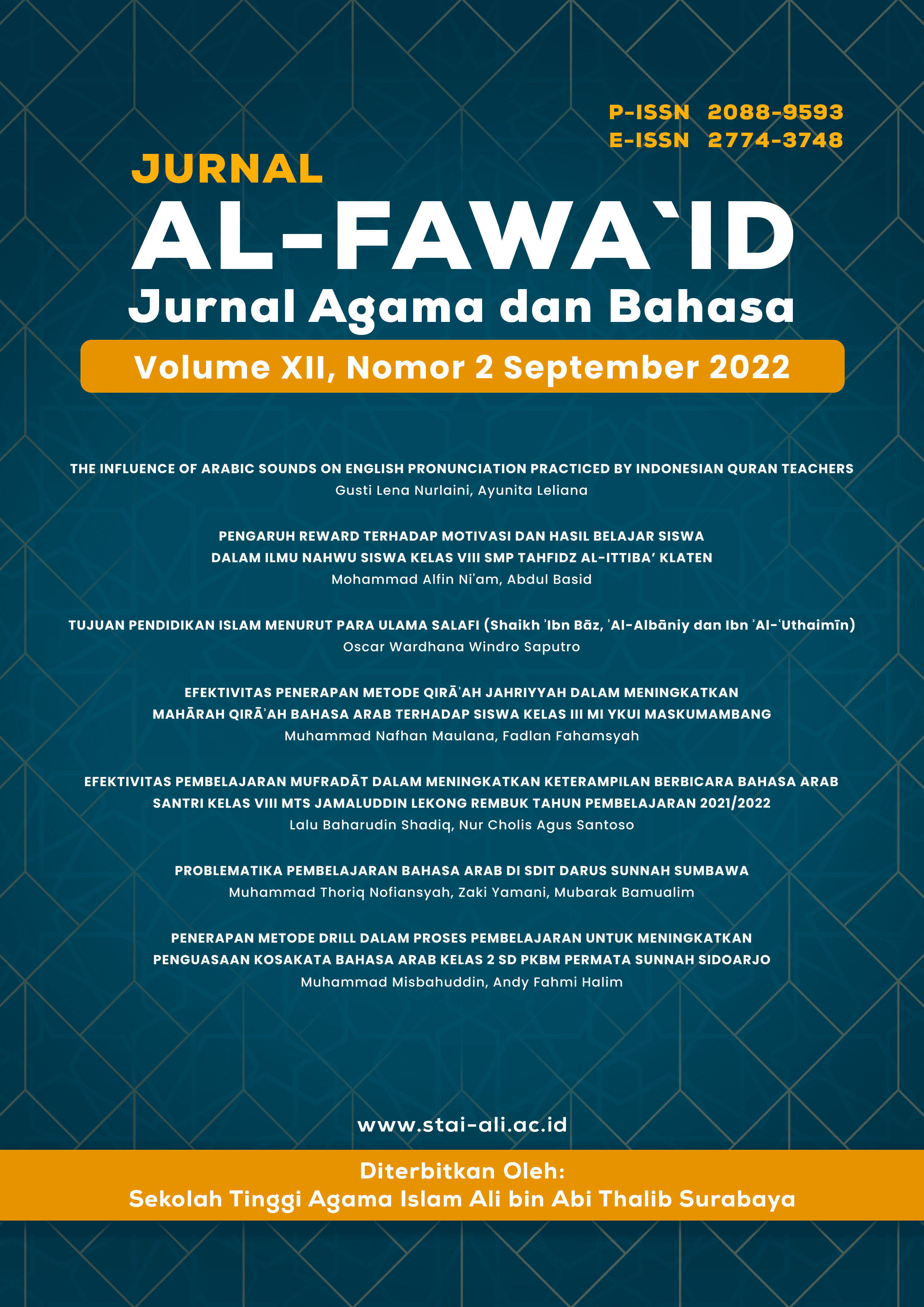EFEKTIVITAS PEMBELAJARAN MUFRADĀT DALAM MENINGKATKAN KETERAMPILAN BERBICARA BAHASA ARAB SANTRI KELAS VIII MTS JAMALUDDIN LEKONG REMBUK TAHUN PEMBELAJARAN 2021/2022
Authors
Lalu Baharudin Shadiq
Nur Cholis Agus Santoso
This study aims to describe and analyze the effectiveness of the mufrodat learning program to improve Arabic language skills in class VIII A students at MTs Jamaluddin Lekong Rebuk. The research design used was a quasi-experimental design in the form of a nonequivalent pre-test-post-test group one-taled group design. The data collection method used purposive sampling technique. To find out the difference (increase) from before and after the action was carried out, a paired sample t test was carried out with the hypothesis H0 = there was no difference between before and after the action was carried out, and H1 = there was a difference between before and after the action. and after the action. The results of the t-test showed that after being given the action, the post-test score of class VIII A students was greater than the pre-test result with the results of tcount(9.996) > ttable(2,093) so that the conclusion was that there was a significant difference in the ability of students before and after the treatment was applied. As for knowing its effectiveness, it is carried out using the n-gain theory, from the results of data analysis using the N-gain theory, the increase is only able to reach 37%. So that the mufrodat-based learning that the researchers did was considered less effective in improving the students' Arabic language skills. This is because the research time is relatively very short, so the results shown are also less than optimal. It is recommended for further research to conduct research with adequate time so that the results achieved are maximal.
Asifuddin, Ahmad Djanan. “Workshop Metodologi Pembelajaran BahasaArab” dalam http://www.umy.ac.id/berita, diakses tanggal 28 September 2021.
Chaer, Abdul. Psikolinguistik Kajian Teoretik, (Jakarta : Rineka Cipta,2003)
Effendi, Ahmad Fuad. Metodologi Pengajaran Bahasa Arab, (Malang : Misykat, 2004)
Evaliani, E. K., Rosilawati, I., & Sunyono, S. (2015). Efektivitas Pendekatan Saintifik Pada Materi Elektrolit Dan Nonelektrolit Dalam Meningkatkan Keterampilan Menyimpulkan. Jurnal Pendidikan dan Pembelajaran Kimia, 4(2), 429-441.
Hake, R. R. (1999). Analyzing change/gain score.[Online] Tersedia:http://www.physics.indiana.edu/nsdi/AnalyzingChange-Gain.pdf [Diakses 28 September 2021.
Hamd, Abdul. Mengukur Kemampuan Bahasa Arab, (Malang: UINMaliki Press, 2013), hlm. 33
Mulyasa, E. Manajemen Berbasis Sekolah, (Bandung : Remaja Rosdakarya, 2003) hlm. 82.
Mustofa, Syaiful. Strategi Pembelajaran Bahasa Arab Inovatif, (Malang: UIN. Maliki Press, 2008)
Nurjaman, A., Purwasih, R., & Sari, I. P. (2018). Meningkatkan kemampuan mahasiswa dalam membuat RPP melalui
penerapan model pembelajaran project based learning. Jurnal Mercumatika: Jurnal Penelitian Matematika dan Pendidikan Matematika, 2(2), 33-40.
Puspita, Eka D, E. P. D., et al. "Efektivitas Modul dengan Model Inkuiri untuk Menumbuhkan Keterampilan Proses Sains Siswa pada Materi Kalor." Tadris: Jurnal Keguruan dan Ilmu Tarbiyah 2.2 (2017): 105-110.
Ramdhani, M. 2012. Efektivitas Penggunaan MediaPembelajaran E-Learning Berbasis Web PadaPelajaran Teknologi Informasi dan KomunikasiTerhadap Hasil Belajar Siswa Kelas X SMA Negeri1 kalasan. Skripsi. Jurnal.uns.ac.id.Yogyakarta :Universitas Negeri Yogyakarta.
Rosida, R., Fadiawati, N., & Jalmo, T. (2017). Efektivitas penggunaan bahan ajar e-book interaktif dalam menumbuhkan keterampilan berpikir kritis siswa. Jurnal Pembelajaran Fisika, 5(1).
Sujud, Aswarni. Matra Fungsional Pendidikan, (Yogyakarta: Purba Sari, 1989),
Yensy, N. A. (2020). Efektivitas pembelajaran statistika matematika melalui media whatsapp group ditinjau dari hasil belajar mahasiswa (masa pandemik Covid 19). Jurnal Pendidikan Matematika Raflesia, 5(2), 65-74.
Zaenuddin, Radliyah. Metodologi dan Strategi Alternatif Pembelajaran BahasaArab, (Yogyakarta : Pustaka Rihlah Group, 2005).
Article Sidebar
Copyright (c) 2023 Lalu Baharudin Shadiq, Nur Cholis Agus Santoso

This work is licensed under a Creative Commons Attribution 4.0 International License.

